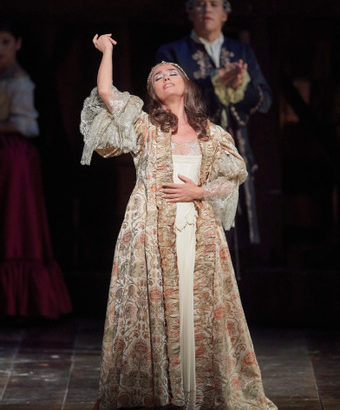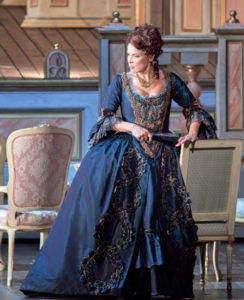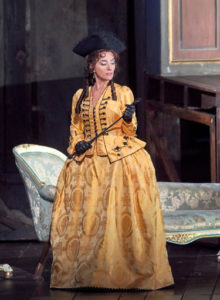Adrienne Lecouvreur lived from 1692 to 1730, the star of the Comédie-Française. So director David McVicar has rightly chosen a period production, and the magnificent sets (Charles Edwards), and imaginatively authentic costumes, are behind the success of Vienna State Opera’s revival. It opens literally behind the scenes, actors, pre-performance, in a dressing room intrigue. There’s a raised stage -within Vienna’s cavernous stage- bad luck if you’ve a restricted view seat,and right-of-stage.
Adriana Lecouvreur (Ermonela Jaho) is in her dressing room: more like a laundry closet- gowns, costumes, hanging haphazardly, ramshackle, a rag-bag. ‘I surrender to the Sultan and his powers’, recites Lecouvreur from her stage role. We’re behind the scenes at the Comédie-Française, performing Molière, whose bust faces us. ‘What a stench the smell of the theatre!’
Jaho, posing like a goddess, yet sings, I am nothing more than the humble maid-servant of the creative genius: echoing the dramatic irony, ‘the delicate instrument in the hands of the artist.’ Jaho, her soprano, seductive, captivating, is in a hooped-up white dress, wearing diamonté tiara and earrings. Theatre Manager Michonnet (Nicola Alaimo) sings he’s loved her for five years, but suffered in silence, put-off declaring his love. What’s the use, she’s so young. (A wedding, she sometimes talks about it.) Alaimo’s baritone, hauntingly moving, his resigned pathos a highlight of the evening.
 Lecouvreur’s ever-anxious about Maurizio (tenor Brian Jagde), the son of a Polish King, ‘called to war’. Now returned, Adriana is ecstatic. Maurizio! They’re all over each other. (He had to wait so long.) Tonight she’ll give a special performance ‘just for him.’ ‘My Gentleman has come home’; she’s no secrets from Michonnet. But he admonishes her, ‘Take care, love has its pitfalls.’ (He should know.)
Lecouvreur’s ever-anxious about Maurizio (tenor Brian Jagde), the son of a Polish King, ‘called to war’. Now returned, Adriana is ecstatic. Maurizio! They’re all over each other. (He had to wait so long.) Tonight she’ll give a special performance ‘just for him.’ ‘My Gentleman has come home’; she’s no secrets from Michonnet. But he admonishes her, ‘Take care, love has its pitfalls.’ (He should know.)
Jagde’s Maurizio is dashing. How impulsive of you, she sings. True love knows no bounds. Cilea’s music is not unlike Puccini’s in its orchestral detail and lavish romanticism. But Collauti’s libretto? Or is it the translation (in the subtitles)? He ‘sees the sweet smiling image of his mother in her’. Or, ‘she’s as beautiful as the ensign of battle.’ But the music is rather special, (even if the lyrics are dubious kitsch.)
The plot gets contrived, intrigues difficult to unravel, with echoes of Les Liaisons Dangéreuse. The Abbé and Prince Bouillon intercept a letter from actress Duclos, (the Princess’s proxy), requesting a rendezvous with Maurizio. And Maurizio, like Valmont, is a libidinous heartbreaker.
Jaho and Jagde’s Act 1 scene is terrific. His excuse is, ‘Glory and honour calls’; he must save his skin. But she accuses him, he’s running away from her; he’s lying, boredom is engraved on his heart : ‘You love another more cunning than I’. While Maurizio smoothly responds, he is ‘indebted to her tender memory’, she sings, if love is a flame, memory is ashes. (She sees through him.)
In the dramatic highpoint of Act 2, the Princess finds herself trapped, the victim of a deception. All exits are barred. Yet mysteriously she’s saved by Lecouvreur. ‘Who are you?’ – ‘Is it you Duchess?’ The revelation for both, they’ve been deceived. The dramatic crux is that the Princess doesn’t see her rival, only hears her voice. The Princess, sings in desperation, Garanča, incandescent, Nothing shall break the bonds between us. But for Lecouvreur, the King of her dreams has fled.
Act 3 (a lavish party given by the Princess), the Ballet is presented on a stage within a stage with Vienna State Ballet’s dancers. A sumptuous entertainment, also for this audience. But the event, a scene of dramatic irony, brings together the protagonists in the sexual rivalry, who haven’t yet come face to face. And the ballet performed is the ‘Judgment of Paris’, (in which Paris has to choose between jealous lovers, Diana, Juno, and Venus.)
Act 4 opens with Michonnet’s aria- Alaimo very impressive, singing of ‘That faithful friend’, who loves her as a father figure. He observes Lecouvreur. Is she asleep: a slow torture, he learned too late. – Yet again, she couldn’t sleep. Jaho sings, Every string of her heart is broken. (She recalls) the Princess bit her lips with rage: the courtesan has stolen his love from me.
A mysterious casket is delivered, containing violets she gave Maurizio as a souvenir. Not from him; surely from a ‘woman’, conjectures Michonnet. Lecouvreur, slowly, insidiously poisoned, Jaho sings poignantly addressing, you poor flowers, condemned to die, Poveri flori. The mistake will perish with you. It’s all over now. Yet Maurizio has returned for her. She’s the only one he wants, he claims. – Empty words, she at first responds. But he actually offer to marry her.
The closing Act bears no comparison with Puccini’s dying divas – say Manon Lesacaut, or La Boheme. Cilea’s -in spite of the lush romantic score -is empty. You’re trembling: are you in pain, my dearest, Maurizio sings- Not any longer. – Adriana, my beloved.- Which beloved?, she retorts. The scene degenerates into melodrama. My daughter, pines Michonnet. Finally freed from pain, she ‘flies to the white light, like a white dove’. Then the bathos. She’s dead, Alaimo’s Michonnet, Jagde’s Maurizio, in unison.
Superficially Cilea’s music is moving, there are some memorable melodies. Adriana Lecouvreur, Cilea’s claim to fame was neglected for a hundred years. Mcvicar’s production, a stellar cast, Vienna forces under Asher Fisch, justified its revival. It isn’t quite great opera, but it’s a hell of a good story. © PR 5.11.2021
Photos Ermonela Jaho as Adriana Lecouvreur; Brian Jagde, Maurizio; Elina Garanča, Princess of Bouillon; Ermonela Jaho, Lecouvreur
© Wiener Staatsoper/ Michael Pöhn




There is a DVD, though not very high quality, very vivid, with Jonas Kaufmann singing Maurizio.